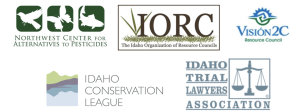
For Immediate Release: Wednesday, February 7, 2024
Contacts:
Christina Stucker-Gassi, Policy Lead, Northwest Center for Alternatives to Pesticides, 541-344-5044 ext. 33
Irene Ruiz, Idaho Organization of Resource Councils, (208) 991-4451
Barbara Jorden, Executive Director, Idaho Trial Lawyers Association, (208) 345-1890
Jonathan Oppenheimer, Government Relations Director, Idaho Conservation League (208) 345-6933 ext. 226
Abby Urbanek, Communications & Marketing Manager, ICL (208) 345-6933 ext. 214
Pesticide Immunity Bill draws opposition from Idaho advocates
Idaho bill would exempt pesticide manufacturers from billion-dollar claims
BOISE, ID – Senate Bill 1245, dubbed the Pesticide Immunity Bill, was approved yesterday on a 5-3 vote in the Idaho Senate Commerce & Human Resources Committee. Concerns were raised from individuals and organizations across Idaho, including farmworker advocates, property owners, conservationists, and legal advocates alike. The bill would exclude Idahoans, who may be harmed by pesticides, from participating in ongoing or future legal cases against pesticide manufacturers.
The bill is similar to other bills advancing in Iowa, Florida, and Missouri that would shield pesticide manufacturers from lawsuits, and appears to be a new tactic in response to legal claims that have cost the companies billions of dollars in recent years.
A number of studies have shown links between exposure to certain commonly used pesticides and health ailments including cancer, Parkinson’s disease, harms to brain development, and other negative effects.
“NCAP is in contact with a number of Idahoans who are dealing with health impacts they believe are linked to their exposure to pesticides, and the legislature should not be preventing them from receiving the justice they deserve,” said Christina Stucker-Gassi from the Northwest Center for Alternatives to Pesticides.
“SB 1245 would eliminate the ability for farmworkers, landscapers, farmers, entire families and communities to participate in lawsuits and class action settlements. It would put the responsibility on farmworkers, taxpayers, insurance companies, and other individuals to cover costs and damages instead of corporate pesticide giants who should be held accountable,” said Marielena Vega, IORC Vice Chair.
“As an organization that works directly with our farmworker community, we have partnerships with other Latine organizations in Idaho, and have had to mobilize and organize without any support from our elected officials. We ask the Idaho Legislature to take a step back and look at the impact this bill would have on our farmworkers. Farmworkers and their families deserve to be protected and should be given the right to bring forth claims against those who threaten their personal health, families, and livelihoods,” Ms. Vega continued.
Many other countries ban the use of certain pesticides that are approved for use in the United States by the Environmental Protection Agency. The EPA has been criticized for their unwillingness to ban pesticides, even after scientists have provided credible evidence linking pesticides to serious health concerns.
Settlements and guilty verdicts against German pharmaceutical giant Bayer alone have exceeded $15+ billion and other individual and class action lawsuits are currently pending against other large multinational pesticide manufacturers. Another Chinese state-owned corporation, Syngenta has faced increased scrutiny over Paraquat, a pesticide linked to Parkinson’s disease. China and at least 57 other countries have banned the use of Paraquat.
“Proving health effects and damages in court is already a high bar, and requires substantial evidence to prove a link between pesticide exposure and human health. The Idaho Legislature should protect the ability of Idahoans to hold pesticide producers accountable,” said Barbara Jorden, with the Idaho Trial Lawyers Association.
Local research in Idaho has shown elevated levels of pesticides in pregnant women who live close to agricultural fields. Another Idaho study found elevated cancer occurrence correlated to pesticide exposure. As a result, the potential threats to rural Idahoans and farmworkers appears highest. However, pesticides can also contaminate groundwater, but it’s hard to track because the Idaho State Department of Agriculture stopped issuing their monitoring report back in 2020.
“The bill would bar the courthouse doors for Idaho farmers, farmworkers, landscapers, neighbors, or others who are harmed by pesticides. Instead of protecting multinational pesticide manufacturers, the Idaho Legislature should instead focus on protecting Idaho taxpayers, and families who may have valid legal claims,” concluded Jonathan Oppenheimer from the Idaho Conservation League.
###
The Idaho Organization of Resource Councils empowers people to improve the well-being of their communities, sustain family farms and ranches, transform local food systems, promote clean energy, and advocate for responsible stewardship of Idaho’s natural resources. Visión 2C Resource Council strives for community driven social justice that is multi-generational, multicultural, and is representative of the people of Canyon County. www.iorc.org
The Idaho Conservation League’s mission is to create a conservation community and pragmatic, enduring solutions that protect and restore the air you breathe, the water you drink, and the land and wildlife you love. www.idahoconservation.org
The Northwest Center for Alternatives to Pesticide works to protect community and environmental health and inspire the use of ecologically sound solutions to reduce the use of pesticides. NCAP has been a resource for Idahoans seeking non-chemical and or least-toxic management of invasive weeds, crop pests, and other unwanted species for over 20 years. www.pesticide.org
The Idaho Trial Lawyers Association is a statewide voluntary bar association dedicated to access to the courts for all Idahoans, representation of consumers, and the improvement of the administration of justice. www.itla.org
